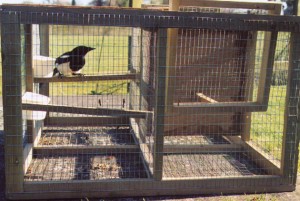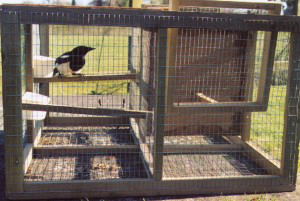 Conservation efforts across Scotland are being hampered by incidents of theft and vandalism of equipment, a new report by BASC Scotland has shown. The results of the study, which was funded by the Scottish Government and is the first of its kind, have revealed that interference with lawfully set traps and snares is widespread and there is a reluctance to report incidents to the police.
Conservation efforts across Scotland are being hampered by incidents of theft and vandalism of equipment, a new report by BASC Scotland has shown. The results of the study, which was funded by the Scottish Government and is the first of its kind, have revealed that interference with lawfully set traps and snares is widespread and there is a reluctance to report incidents to the police.
This type of criminal damage can have a significant impact on local biodiversity and the protection of livestock and wild birds at breeding times.
Pest and predator control is an integral part of conservation and wildlife management. It is necessary to reduce predation and damage, particularly at vulnerable times of the year such as nesting seasons. It is the responsibility of all of those involved in pest and predator control to ensure their methods are legal, humane and carried out with sensitivity and respect for other countryside users.
Dr Colin Shedden, director of BASC Scotland and author of the report, said: “Lawful traps and snares play an important part in wildlife management and conservation. This report has made it clear that theft and criminal damage of traps and snares does happen and that it is a problem that needs to be addressed. The report is the tip of the iceberg as we do not know the total number of incidents reported to the police, nor the number of incidents that went unreported. The study will continue and we urge anyone affected to report any incidents to the police and to also let us know so that we can keep updating the report to gain a more detailed insight.”
Alan Balfour, chairman of BASC’s Scottish Committee, said: “BASC members play a crucial role in the management of the Scottish countryside providing the equivalent of 3,900 full-time conservation employees for Scotland. Traps and snares help conserve some of Scotland’s most iconic species such as the red squirrel and the curlew. BASC members support Police Scotland in its efforts to trace and apprehend all wildlife criminals including those who interfere with lawfully set traps and snares.”
Andrew Mavin, Police Scotland Wildlife Crime Coordinator said: “Any members of the public who have concerns over the possible illegal use of traps and snares in the countryside should get in touch with Police Scotland and ask to speak to a Wildlife Crime Officer. Depending on the circumstances, interfering with otherwise legal traps and snares could be an offence, as well as the possibility that such action may be harmful to both themselves and wildlife.”
All reports to the police should be copied to trapsandsnares@0ld.basc.org.uk
For more information, click here.
ENDS
